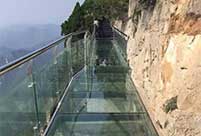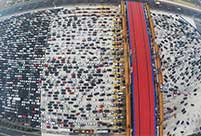

China's President Xi Jinping (L) views satellite coverage screens in the Network Operation Centre control room with Rupert Pearce, CE of Inmarsat, during his visit to Inmarsat in London, Britain Oct 22, 2015.[Photo/Agencies]
Inmarsat Plc agreed a strategic partnership with China Transport Telecommunication &Information Center on Thursday during President Xi Jinping's visit to the headquarters of the British satellite telecoms company.
The agreement with CTTIC means that Inmarsat's revolutionary Global Xpress mobile satellite broadband service will be rolled out throughout China.
The deal between Immarsat and CTTIC will not only produce business opportunities in China but also in more than 60 countries in Asia, the Middle East and Europe that make up the Belt and Road Initiative.
Xi, who proposed the policy in 2013, toured Inmarsat's Network Operations Centre to understand how Global Xpress works. The system is effective in rural regions where it is impossible to pick up traditional mobile signals.
Xi said that China and Inmarsat have solid foundation of cooperation.
China is willing to work with other countries to increase telecommunications quality internationally, to create an information silk road, Xi said.
This will provide communications for Chinese companies and their partners working in difficult terrain, particularly during the construction of major infrastructure projects. It will also allow them to keep in contact in emergency situations.
"Our advantage is that we have a resilient means of communication, as we run the Global Maritime Distress and Safety System, to help protect the safety of people," said Chris McLaughlin, senior vice-president at Inmarsat.
Part of the agreement will also allow Inmarsat and CTTIC to provide satellite broadband for airline passengers and next-generation safety systems for the commercial Chinese aviation industry.
The company's advanced technology was used to help pinpoint the southern corridor flight path taken by the missing Malaysian Airlines flight MH370 last year. During the search for Boeing 777, it worked closely with China's government.
Recognized as one of the leader's in the field of satellite technology, Inmarsat has a long working relationship with the country, with its systems used to safeguard security in the aviation and maritime industries.
In 2008, Inmarsat also worked with the Chinese government during the rescue operation after the Sichuan earthquake. Aid workers used the company's satellite system to keep in touch.
Apart from the deal with CTTIC, Inmarsat is helping Air China, one of the country's leading airlines, with technology to provide signals to onboard passengers.
 |
 Love beyond limit of heights in the world
Love beyond limit of heights in the world
 When a Chinese woman marries an Indian man
When a Chinese woman marries an Indian man Photos of beautiful teacher hit the Internet
Photos of beautiful teacher hit the Internet Transparent Over-cliff Path Cracked Suddenly
Transparent Over-cliff Path Cracked Suddenly Bride-to-be tries to save drowned man
Bride-to-be tries to save drowned man Models change clothes on street in Hangzhou
Models change clothes on street in Hangzhou In pics: army beauties across world
In pics: army beauties across world Math teacher makes 'solar powered electric car'
Math teacher makes 'solar powered electric car' Heavy traffic turns expressway into huge parking lot
Heavy traffic turns expressway into huge parking lot Top 20 hottest women in the world in 2014
Top 20 hottest women in the world in 2014 Top 10 hardest languages to learn
Top 10 hardest languages to learn 10 Chinese female stars with most beautiful faces
10 Chinese female stars with most beautiful faces China’s Top 10 Unique Bridges, Highways and Roads
China’s Top 10 Unique Bridges, Highways and Roads Held in the back seat
Held in the back seat Free streaming days over
Free streaming days over Fears for HK tourism after visitor killed
Fears for HK tourism after visitor killed Counterfeit Viagra pills raise their ugly head in China
Counterfeit Viagra pills raise their ugly head in ChinaDay|Week